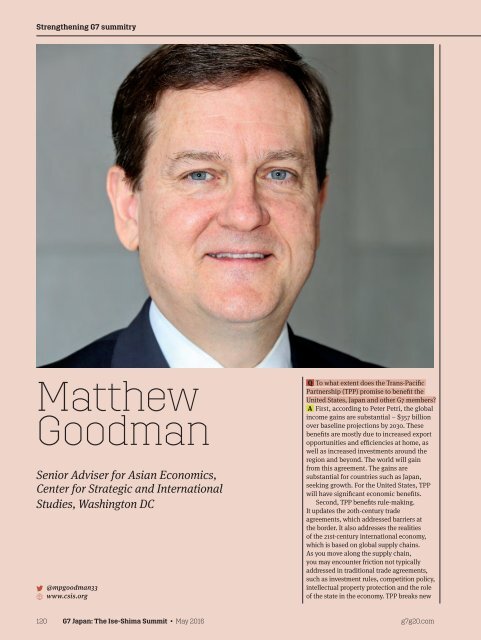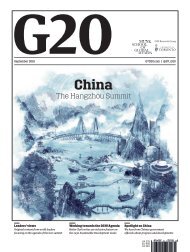G7_JAPAN
You also want an ePaper? Increase the reach of your titles
YUMPU automatically turns print PDFs into web optimized ePapers that Google loves.
Strengthening <strong>G7</strong> summitry<br />
Matthew<br />
Goodman<br />
Senior Adviser for Asian Economics,<br />
Center for Strategic and International<br />
Studies, Washington DC<br />
@mpgoodman33<br />
www.csis.org<br />
Q To what extent does the Trans-Pacific<br />
Partnership (TPP) promise to benefit the<br />
United States, Japan and other <strong>G7</strong> members?<br />
A First, according to Peter Petri, the global<br />
income gains are substantial – $357 billion<br />
over baseline projections by 2030. These<br />
benefits are mostly due to increased export<br />
opportunities and efficiencies at home, as<br />
well as increased investments around the<br />
region and beyond. The world will gain<br />
from this agreement. The gains are<br />
substantial for countries such as Japan,<br />
seeking growth. For the United States, TPP<br />
will have significant economic benefits.<br />
Second, TPP benefits rule-making.<br />
It updates the 20th-century trade<br />
agreements, which addressed barriers at<br />
the border. It also addresses the realities<br />
of the 21st-century international economy,<br />
which is based on global supply chains.<br />
As you move along the supply chain,<br />
you may encounter friction not typically<br />
addressed in traditional trade agreements,<br />
such as investment rules, competition policy,<br />
intellectual property protection and the role<br />
of the state in the economy. TPP breaks new<br />
120 <strong>G7</strong> Japan: The Ise-Shima Summit • May 2016 g7g20.com
















